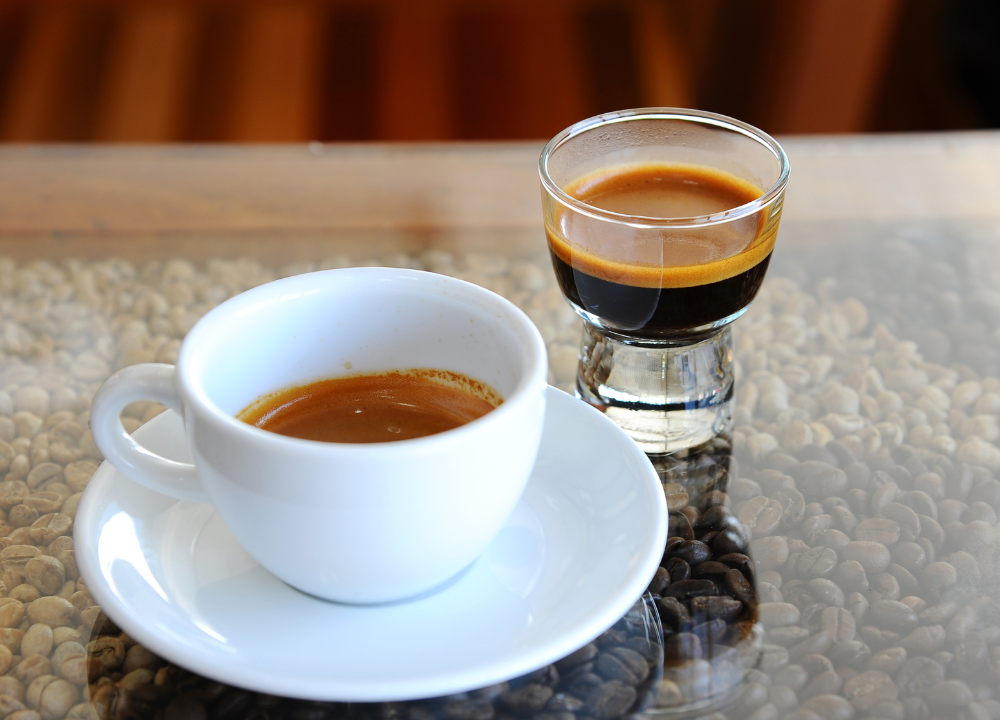This unique brew is gaining popularity for its rich taste and smooth texture. Ristretto uses less water, which means it has a thicker body and a sweeter flavor than regular espresso.
What Is Ristretto Coffee?
Ristretto coffee is a unique and flavorful drink that coffee lovers often seek out. It offers a different experience compared to regular espresso. This post will explore its definition, origins, strength, and how to make it.
Coffee Ristretto Definition
Ristretto is a type of espresso made with the same amount of coffee but less water, resulting in a shorter extraction time. The choice of coffee beans for ideal Ristretto plays a vital role in achieving the intense and concentrated flavors that define ristretto.
Key features of ristretto coffee include:
- Shorter Extraction: It uses less water than a regular espresso.
- Flavor Profile: Ristretto has a sweeter and richer taste.
- Caffeine Content: It contains similar caffeine levels to espresso.
Here is a quick comparison of ristretto and espresso:
| Feature | Ristretto | Espresso |
|---|---|---|
| Water Used | Less | More |
| Extraction Time | Shorter | Longer |
| Taste | Rich and Sweet | Bold and Bitter |
This unique brewing method makes ristretto a favorite among those who enjoy a strong coffee experience without the bitterness.
Origins Of Ristretto Coffee
The origin of ristretto coffee dates back to Italy. It emerged in the mid-20th century. Baristas began experimenting with espresso techniques. They wanted to create a coffee that was more concentrated.
The word “ristretto” means “restricted” in Italian. This refers to the limited amount of water used in the brewing process. Over time, it gained popularity among coffee enthusiasts.
Key points about the origins include:
- Italian Influence: Ristretto is deeply rooted in Italian coffee culture.
- Barista Technique: It showcases the skill of skilled baristas.
- Cultural Spread: Ristretto has spread globally, enjoyed in many coffee shops.
Today, many coffee lovers appreciate ristretto for its unique flavor and texture. It stands as a testament to the art of coffee making.
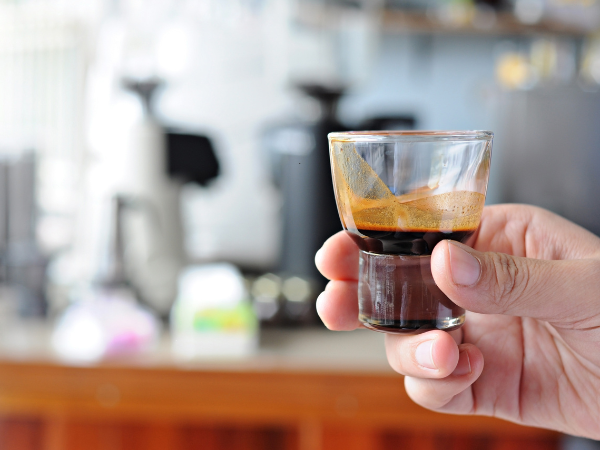
Ristretto Coffee Vs. Espresso
Understanding Ristretto coffee vs. Espresso helps you choose the right drink for your taste. Let’s explore the main differences between these two popular coffee styles.
Key Differences In Brewing Method
The brewing method for ristretto and espresso varies in technique and timing. Here are the main points:
- Grind Size: Ristretto uses a finer grind than espresso.
- Water Amount: Ristretto uses less water.
- Extraction Time: Ristretto brews for a shorter time, about 15-20 seconds.
- Pressure: Both drinks use high pressure, but ristretto often requires a slightly lower pressure setting.
The table below summarizes the differences:
| Feature | Ristretto | Espresso |
|---|---|---|
| Grind Size | Finer | Medium |
| Water Amount | Less | More |
| Extraction Time | 15-20 seconds | 25-30 seconds |
| Pressure | Lower | Higher |
These differences create a unique coffee experience. Ristretto is often seen as a more intense shot. Espresso, while strong, has a longer extraction time, resulting in a different flavor profile.
Taste And Strength Comparison
The taste of ristretto is distinct from espresso. Ristretto is richer and has a more intense flavor. Here are some key points:
- Flavor Profile: Ristretto tends to be sweeter with more body.
- Bitterness: Ristretto has less bitterness than espresso.
- Strength: Both are strong, but ristretto packs more flavor in a smaller volume.
In terms of caffeine content, both drinks have similar amounts. However, the perception of strength differs. Ristretto often feels stronger due to its concentrated nature. The shorter extraction time brings out different flavors, making it sweeter and smoother. Espresso can taste more balanced but slightly more bitter.
Acidity
Acidity plays a crucial role in coffee flavor. Ristretto and espresso have different acidity levels. Here’s how they compare:
- Ristretto: Generally has lower acidity. The shorter brewing time leads to a smoother taste.
- Espresso: Can have higher acidity, depending on the beans used.
The table below highlights their acidity levels:
| Coffee Type | Acidity Level |
|---|---|
| Ristretto | Low |
| Espresso | Medium to High |
For those sensitive to acidity, ristretto offers a smoother option. It appeals to those who prefer a less tangy coffee. Espresso lovers may enjoy the bright, crisp notes that come with a higher acidity.
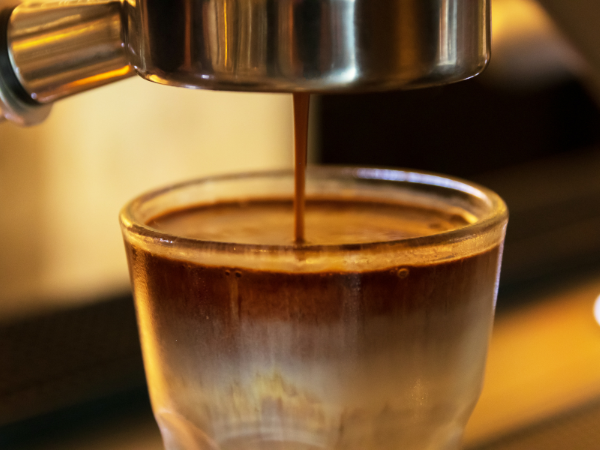
How Strong Is Ristretto Coffee?
Understanding how strong ristretto coffee is can help you appreciate its taste and effects better. Let’s explore the strength of ristretto coffee and its benefits.
Concentration And Caffeine Content
Ristretto coffee is known for its rich and intense flavor. It is made with less water than a regular espresso. This makes it thicker and more concentrated. The caffeine content in ristretto can be surprising. Here are some key points:
- Ristretto uses the same amount of coffee grounds as espresso.
- However, it extracts coffee for a shorter time.
- This process results in a sweeter and less bitter taste.
When comparing caffeine content, here is a quick look:
| Coffee Type | Serving Size | Caffeine Content (mg) |
|---|---|---|
| Ristretto | 1 ounce | 30-40 |
| Espresso | 1 ounce | 63 |
| Regular Coffee | 8 ounces | 95 |
Ristretto has less caffeine than regular espresso but is still strong. This makes it a great choice if you want a bold flavor without too much caffeine.
How Ristretto Coffee Helps You Stay Awake
Ristretto coffee can help you stay alert. Its concentrated flavor provides a boost. People often drink it for energy. Here’s how it works:
- Ristretto’s caffeine stimulates the central nervous system.
- It can improve mood and increase alertness.
- The rich flavor may also make you feel more awake.
Many people find that a small amount of ristretto is enough. It can give you energy without making you feel jittery. This is because of its unique extraction process. It balances flavor and caffeine well.
Ristretto Coffee Helps You To Focus: Fact Or Myth?
Some believe that ristretto coffee helps improve focus. This idea has some truth to it. The caffeine in ristretto can enhance concentration. Here are some facts:
- Caffeine increases dopamine levels, which can improve focus.
- The less bitter taste may make it more enjoyable to drink.
- Many people associate coffee with productivity.
Studies show that caffeine can help with short-term memory and attention. However, too much caffeine can lead to anxiety. Finding the right amount is important. Ristretto can be a good option for a quick boost without feeling overwhelmed.
Ristretto Coffee Recipe
Making ristretto coffee at home is simple. You need a few ingredients and tools. Here’s a basic recipe:
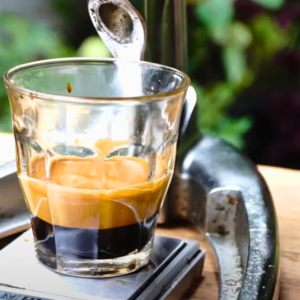
Ristretto Coffee Recipe
Equipment
- Coffee grinder
- Portafilter
- Brewing chamber
- Tamper
- Kettle
- Scale
Ingredients
- 16 grams coffee (finely ground)
- 50 grams boiling water
Instructions
- Weigh and Grind the Coffee: Measure out 16 grams of coffee and grind it to a texture slightly coarser than what you would use for a standard espresso machine. Add the ground coffee directly into the portafilter.
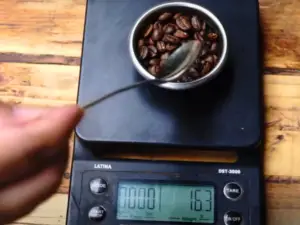
- Preheat and Tamp: Boil water and preheat your brewing chamber with some of the boiling water. Once heated, tamp the coffee grounds evenly using a tamper to ensure uniform extraction.
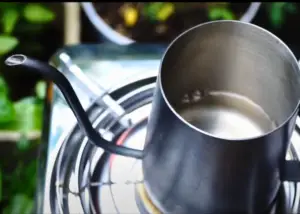
- Assemble and Add Water: Carefully assemble your brewing chamber, then pour 50 grams of boiling water into the chamber, making sure the coffee grounds are well saturated. Attach the group head to the brewing setup.
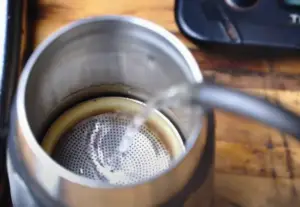
- Brew the Ristretto: Start brewing your Ristretto. Aim for a 16-gram output (using a 1:1 ratio) within 15-20 seconds. You can slightly adjust the brewing time and water quantity based on your coffee's characteristics.


